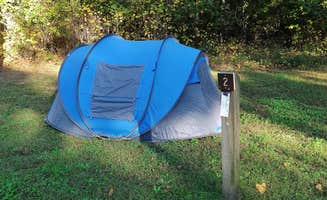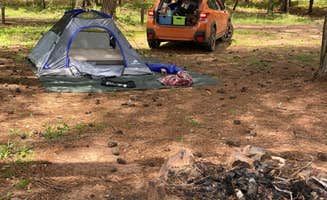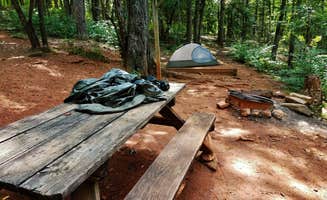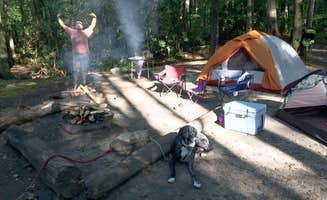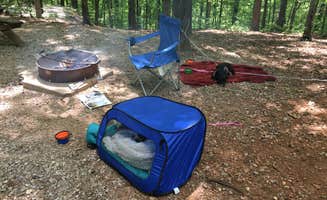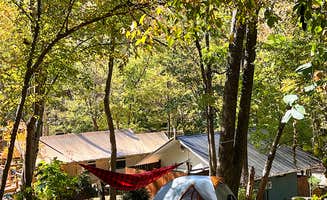Tent camping near Green Pond, South Carolina provides access to several wilderness areas within the Blue Ridge Mountain foothills. This region features elevations ranging from 600 to 3,500 feet with mixed hardwood forests and notable granite formations. Winter temperatures typically range from 30-50°F, while summer months can reach 85-95°F with higher humidity levels.
What to do
Waterfall exploration: Multiple trails near Jones Gap State Park Campground lead to scenic waterfalls. "The sites are clean and well maintained. As you're in a state park, you have the added benefit of a fire ring and tent pad, but no picnic table," reports Emily S. The park offers several waterfall access points less than 2.5 miles from the campsites.
Fishing opportunities: Creeks and lakes throughout the region provide fishing access. At Sedalia Campground, visitors can find "access to running water" while Susan B. notes it's a "nice, quiet campground" with good fishing spots. The nearby streams contain trout and bass, with fishing licenses required ($11 for a 14-day non-resident license).
Trail connectivity: The wilderness areas feature interconnected trail systems. "My family and I mainly hike to the first-come-first-serve campsites but there are also a lot of boaters tying off at the shoreline. It features two bridges and a waterfall/river," explains Maggie J. about camping at Jocassee Gorges. Most trails are moderate difficulty with substantial elevation changes of 500-1,000 feet.
What campers like
Spacious camping areas: Many tent sites provide ample room. At Jocassee Gorges Wildlife Management Area, Maggie J. recommends "campsites right across from the concession building on the other side of the lake" noting they are "well kept and are considered drive-in." Most tent pads can accommodate 2-3 tents with additional room for gear.
Fresh water sources: The region offers clean water access. Benjamin C. describes Jocassee Gorges as having "clean and clear water like we haven't experienced before. Beautiful water falls!" While most primitive sites require water filtration, several campgrounds provide potable water sources within walking distance of tent sites.
Backcountry solitude: Weekday camping offers exceptional privacy. "This is a primitive campground with no amenities except for solitude," writes Myron C. about Pine Point Primitive Campground. He adds, "you do have to pack everything in and pack everything out." Many sites are spaced 200+ feet apart, with limited or no visibility between neighboring campsites.
What you should know
Limited facilities: Most tent sites have minimal amenities. Kirsten J. notes about Pine Point: "The hike is an easy half mile, on a trail, with slight ups and downs. I don't recommend rolling anything down the trail (no stroller, wagon, etc.) but instead, be ready for a short walk." Vault toilets are typically the only bathroom facilities available at primitive sites.
Seasonal considerations: Different seasons offer varying camping experiences around Green Pond. "If you want to get away from civilization, this might be the place to camp," says Myron C. about Sedalia Campground, which remains open year-round but experiences higher usage during hunting seasons when it "often gets packed" according to Wolf R. N.
Terrain challenges: Some tent sites require navigating uneven ground. Kevin G. from Jones Gap notes: "The pad that has been cleared isn't perfectly level, but it's fine. There are however a few large buried rocks that keep it from being as smooth as you might expect." Many campsites require sturdy footwear due to rocky, rooted terrain.
Tips for camping with families
Choose accessible sites: Some locations offer shorter hikes suitable for children. Laura C. recommends Jones Gap State Park Campground spot #8, which is "the closest walk in spot from the Parking area. We were able to hike in a ton of gear (coolers, dog bed, etc.) with a little work and a few trips." This site is approximately 0.25 miles from the parking area.
Plan for weather variability: Mountain weather can change quickly, with afternoon thunderstorms common in summer. "The rushing river and dense foliage with tons of mountain laurel makes the air seem so fresh," explains John R. about camping at Jones Gap, though river proximity can mean cooler nighttime temperatures and occasional morning fog.
Explore educational opportunities: Several parks offer ranger-led programs. "The ranger station has a nice picnic area with a little store, a bath house with flush toilets and hot showers, and an old retired fish hatchery to explore," shares Diana C. Programs typically run weekends from May through October and cover topics from local wildlife to forest ecology.
Tips from RVers
Size limitations: Most tent camping areas near Green Pond cannot accommodate large RVs. Candy H. notes that Jocassee Gorges Wildlife Management Area is "not big rig friendly" with a "small campground loop." Access roads typically have width restrictions and tight turns that limit RV size to under 25 feet in most areas.
Alternative options: Smaller RVs can find suitable camping at select locations. Adam V. describes Denver Downs Farm as having "a 140 acre field you can camp in" that feels "very safe" though "there is no water or any hookups. You will need to pack in and pack out everything." RVs under 20 feet can typically access these areas with careful driving.


